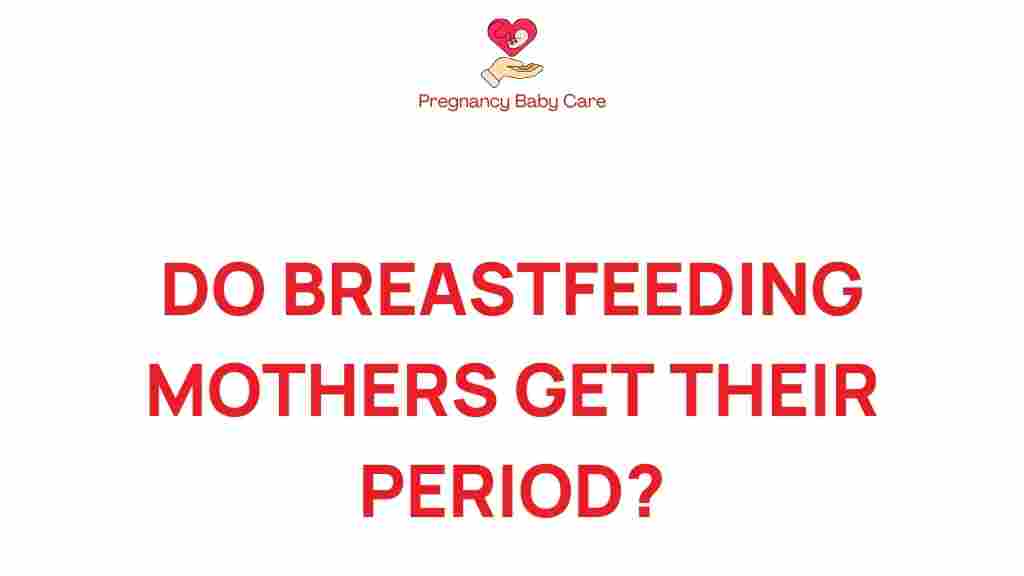Do Breastfeeding Mothers Experience Menstrual Cycles?
Breastfeeding is a natural and beautiful part of mothering, providing essential nutrition to newborns while also fostering a deep bond between mother and child. However, many new mothers wonder about the relationship between breastfeeding and their menstrual cycles. Do breastfeeding mothers experience menstrual cycles? The surprising truth is that the answer varies significantly among individuals. In this article, we will explore how breastfeeding affects the menstrual cycle, the role of hormones, and what this means for postpartum fertility and health.
Understanding the Menstrual Cycle and Breastfeeding
The menstrual cycle is a complex interplay of hormones that typically starts with the first menstruation after childbirth. However, for breastfeeding mothers, the timeline for the return of their periods can be quite different. Let’s delve into how breastfeeding influences this process.
The Role of Hormones
During the postpartum phase, several hormones play crucial roles in a mother’s body. The primary hormones involved in breastfeeding and the menstrual cycle are:
- Prolactin: This hormone is responsible for milk production. Elevated prolactin levels are common during breastfeeding, which can suppress ovulation.
- Estrogen: This hormone typically regulates the menstrual cycle. During breastfeeding, estrogen levels remain lower, delaying the return of periods.
- Progesterone: After ovulation, progesterone prepares the uterus for a potential pregnancy. Low levels during breastfeeding can also inhibit menstruation.
As long as prolactin levels remain high due to frequent breastfeeding, the menstrual cycle may be delayed. This is often referred to as lactational amenorrhea.
Lactational Amenorrhea: What to Expect
Lactational amenorrhea is a natural phenomenon that can last for several months or even longer, depending on individual circumstances. Here are some common experiences:
- Exclusive Breastfeeding: Mothers who exclusively breastfeed their newborns (without supplementing with formula) may not experience a period for six months or more.
- Partial Breastfeeding: If a mother is supplementing breastfeeding with formula or introducing solids, her menstrual cycle may return sooner.
- Individual Variation: Every woman’s body is different; some may find their periods return as early as a few weeks postpartum, while others may not menstruate for over a year.
Factors Influencing the Return of Your Period
The return of a menstrual cycle during breastfeeding can be influenced by several factors:
- Frequency of Nursing: The more often a mother breastfeeds, particularly at night, the longer it may take for her period to return.
- Duration of Breastfeeding: Longer breastfeeding durations are generally associated with delayed menstruation.
- Individual Hormonal Levels: Variations in hormonal levels among women can lead to different experiences regarding the return of menstrual cycles.
Postpartum Fertility and Breastfeeding
Many breastfeeding mothers are concerned about fertility and the possibility of getting pregnant while nursing. Here’s what you need to know:
- Risk of Ovulation: While breastfeeding can delay ovulation, it is not a foolproof method of contraception. It is possible to ovulate before the first postpartum period.
- Signs of Fertility: Some women may notice signs of fertility, such as changes in cervical mucus or an increase in libido, even before their period returns.
- Contraceptive Options: If you wish to avoid pregnancy while breastfeeding, consult your healthcare provider for suitable contraceptive methods.
What Happens When Your Period Returns
When your menstrual cycle resumes, it can bring about various changes in your body and breastfeeding experience:
- Changes in Milk Supply: Some mothers report a temporary decrease in milk supply around the time their period starts, but this typically stabilizes.
- Breastfeeding Discomfort: Hormonal fluctuations may lead to tender breasts or discomfort during breastfeeding.
- Menstrual Symptoms: Pre-menstrual symptoms such as bloating or mood swings may occur, but these are often manageable.
Troubleshooting Common Concerns
New mothers often have questions or concerns when their menstrual cycle returns during breastfeeding. Here are some common issues and tips for addressing them:
1. Decrease in Milk Supply
If you notice a decrease in milk supply coinciding with your period, consider the following:
- Stay Hydrated: Ensure you are drinking enough water, as hydration can affect milk production.
- Frequent Nursing: Continue to nurse often, as this stimulates milk production.
2. Breast Pain or Discomfort
If you experience breast pain or tenderness during your period:
- Warm Compresses: Applying warm compresses can help relieve discomfort.
- Supportive Bras: Wearing a well-fitted, supportive nursing bra can provide comfort.
3. Changes in Newborn Behavior
Some newborns may seem fussier when their breastfeeding mother’s period returns:
- Monitor Nursing Patterns: If your baby seems more irritable, pay attention to their nursing patterns and adjust as needed.
- Seek Support: Don’t hesitate to reach out to a lactation consultant for guidance and support.
Conclusion
The question of whether breastfeeding mothers experience menstrual cycles is nuanced and varies from one individual to another. While lactational amenorrhea can delay the return of menstruation, many factors influence this timeline, including breastfeeding frequency and individual hormonal levels. Understanding these dynamics can empower new mothers to navigate their postpartum health more effectively.
As you embrace the journey of motherhood, remember that each experience is unique. If you have specific concerns about your menstrual cycle, breastfeeding, or postpartum fertility, consider consulting with a healthcare professional for personalized advice and support. For further reading on postpartum health, check out this comprehensive guide on maternal health. Your body is doing remarkable work, and knowledge is a powerful tool in your mothering journey.
This article is in the category Health and created by PregnancyBabyCare Team
